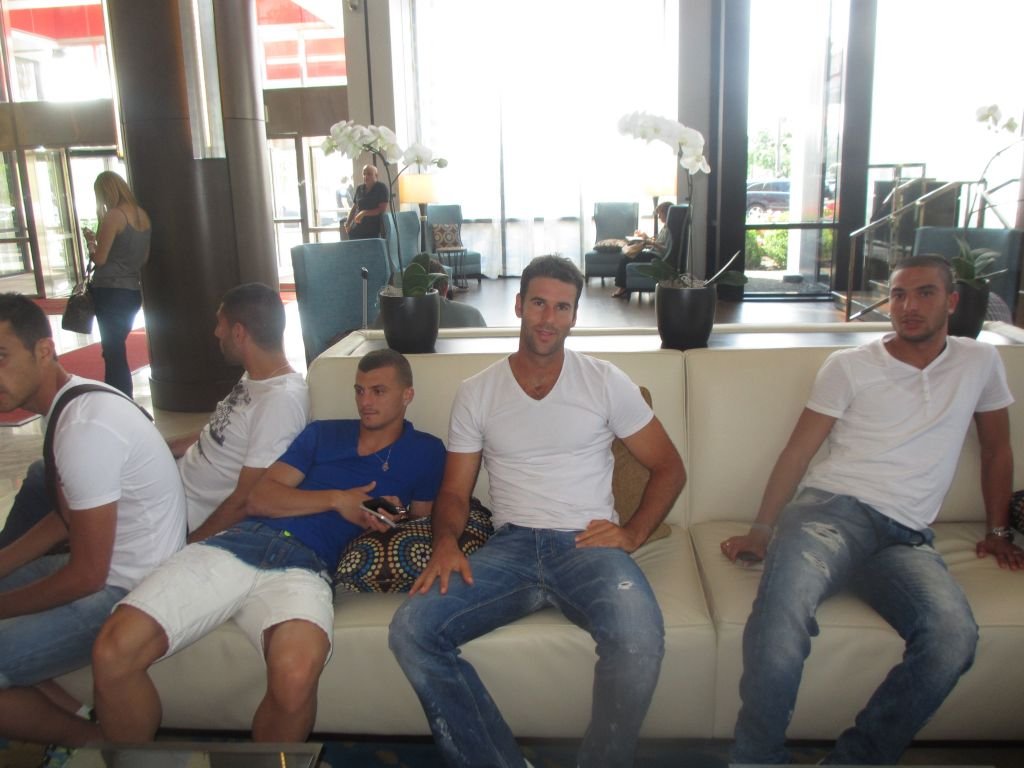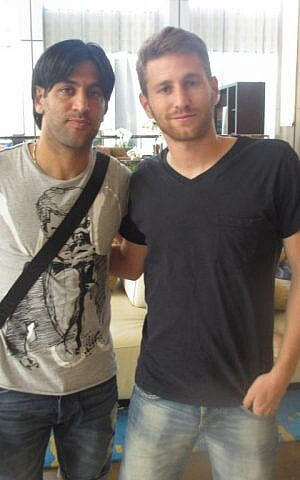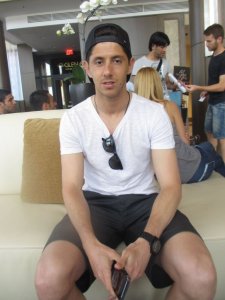Jewish state’s elite squad is relaxed, ready and eager for Sunday’s exhibition game against Honduras
NEW JERSEY — The Israel national soccer team touched down at Newark Airport at 5:30 Thursday morning. By 9 a.m., the freshly showered guys were lounging on the white leather sofas of their New Jersey hotel — calling girlfriends, Skyping mothers, and playfully bantering with teammates, some of whom they hadn’t seen since their impressive 2-0 March 26 World Cup qualifier victory over Northern Ireland in Belfast.
The team came to New York for an exhibition game against Honduras Sunday at Citi Field, home of the New York Mets baseball team. The game — the national team’s first here for 35 years — is the final event of “Celebrate Israel NY” which also includes a Celebrate Israel Run in Central Park and the Celebrate Israel Parade.
While willing to give exclusive-on-arrival interviews to The Times of Israel, most players — many in the United States for the first time — were admittedly more interested in the van, soon to arrive to take them to a nearby shopping mall. Three of the adventuresome players hired a driver to take them straight to Manhattan. Thursday was a free day. A late-afternoon practice was set for Friday at New Jersey’s Montclair State University.

Midfielder Sheran Yeini was excited to be in New York, “one of the best cities in the world.” The Maccabi Tel Aviv player said, “I can’t wait to see the stadium — I know it is a baseball stadium!” It takes 48 hours to convert Queens’ Citi Field for soccer.
Yeini and teammate Elyaniv Barda, a forward originally from Beersheba, and a sixth-year member of the Belgian Racing Genk soccer club, take turns rattling off positive comments about the game and the national team: “We want to represent Israel. We need you! Come to the game and show your support!”
Both made reference to the Celebrate Israel Parade on June 2, on Manhattan’s Fifth Avenue.

“Two or three players will be on a float at the parade — then they will rush to the game,” Yeini said.
Defender Dekel Keinan of Haifa felt both the game and his time in the States “will be an adventure.” Fellow defender, Rami Gershon, originally from Rishon Letzion, was similarly enthusiastic in describing his first trip to the US. “We are looking forward to all of our supporters coming out to the game. We hope families will come.”
“Kol Yisrael Achim,” he then shouted. “All Jews are brothers!”
Gershon, who has played soccer for a Belgium team in Antwerp and currently plays for Scottish Premier League champions, Celtic, reported that he has never experienced anti-Semitism or anti-Israel sentiment overseas. “People are supportive and helpful.”
Midfielder Maor Melikson of Yavneh, a player on France’s Valenciennes club, said much the same. “There is no anti-Semitism — the other way around. People bring Israeli flags to the game.” Melikson was in the States six months ago with his wife, who is not accompanying him on this trip. He will travel to Las Vegas for four days following Sunday’s game. “I am looking forward to all the Jews coming out to cheer for us!”

Eli Guttman, coach of Israel’s National team (who with players Tel Ben Haim and Rami Gershon gave an online interview May 29, as part of “Hangout on Air with Israel’s National Team”) was not hanging out in the lobby with his players. He was reportedly resting. Guttman was no doubt pleased that Pierre Mevy Azaria, CEO of MCI Sport, the event organizer, promoter and chief logistical officer, had recently “rescued” Guttman’s hotel suite, which had been “reassigned” to another hotel guest.
In the online interview, Guttman acknowledged that Sunday’s game “is an important game for us — every game for the National Team is important.” But he conceded that it has greater significance for Honduras. “On [June 7] Honduras plays against Costa Rica in the 2014 World Cup Qualification. For them, they must be on a high level. We, after the game, will be on our vacation.” Still, he said of the game, “We are serious, and we want to be proud.”
According to Mevy Azaria, more than half of the players will be staying in the States from three days to a week, to relax and travel.
In the days leading up to the game, there is still work to be done. Sharon Eyny, director of GIDNY (getitdoneny), seemed relieved when the players boarded the bus for their shopping excursion. She could get back to selling tickets and coordinating logistics.
In the Jewish and Israeli communities, she and her team have reached out to synagogues, restaurants, venues hosting performances by Israeli musicians and more.
And while unwilling to disclose the number of tickets sold to date, she noted that “The Hondurans are passionate about soccer.”
(Source: http://www.timesofisrael.com)





